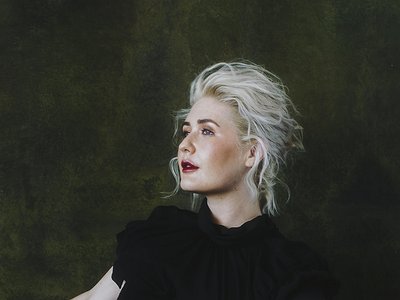Part 2
Take us through a day in your life, from a possible morning routine through to your work, please. Do you have a fixed schedule? How do music and other aspects of your life feed back into each other - do you separate them or instead try to make them blend seamlessly?
I’m a work hard, play hard kind of person but music is always present and I work more than I play… When I’m working however, usually juggling multiple projects (though I prefer to work on one at a time for my most creative output now), I wake up very early. Coffee, The New Yorker for 30 mins, water my garden, tend to my plants, then get stuck in. My most productive hours are between 5 A.M. and 3 P.M. so I try to keep very strict mornings when I’m on deadlines. I frequently walk out to my garden to break up my hours in my chair to weed my little plots and stretch. When a project ends, I sleep a lot. I let loose. I eat, drink and try to explore hobbies I’ve always wanted to jump into. Ultimately balance is a myth as far as my experience has shown me, but I remain wryly hopeful… I’m not so sure it’s possible to be honest with this career path.
Can you talk about a breakthrough soundtrack in your career? Why does it feel special to you? When, why and how did you start working on it, what were some of the motivations and ideas behind it?
My first soundtrack for Bang Gang changed everything for me. And I think that my most recent soundtrack for Mothering Sunday (for the same director Eva Husson), is my best work yet. I feel I have earned the creative growth that manifested with this work. Loyal collaboration- common cinematic language, deep friendship and creative trust… it is myth making but for good reason. Aging creatively has been a wonder I am lucky to explore. With this most recent project, I was really inspired by the script and the cast, it was a joy to approach the project armed with strong emotional goalposts: intimacy, warmth, ebb, flow and grief.
There are many descriptions of the ideal state of mind for being creative. What is it like for you? What supports this ideal state of mind and what are distractions? Are there strategies to enter into this state more easily?
I try not to judge the initial outpouring. My best ideas flow quite rapidly when they decided to visit. Phones are distracting. Intention, though fruitful at times, can be a trap. I try to spaghetti as much as possible and then chisel when I broach a new project. Time, frankly, is my best friend. With each passing year I get looser, less judgmental of my work and more capable of entering a flow state when I need to create.
Music and sounds can heal, but they can also hurt. Do you personally have experiences with either or both of these? Where do you personally see the biggest need and potential for music as a tool for healing?
Music sets the tone of so many interpersonal and solo experiences. It’s like scent. It’s deeply rooted in memory for me. Music and sound can shape the way you make love, the way you sleep, the feeling of safety, fear. The way you remember a moment in time. Sometimes I just need silence. That can be the most healing and the most confronting sound of all I’ve come to realize.
There is a fine line between cultural exchange and appropriation. What are your thoughts on the limits of copying, using cultural signs and symbols and the cultural/social/gender specificity of art?
There is no right way to answer this question. But at the end of the day, I believe whole-heartedly in the exchange of musical ideas, the grace and intention one needs to find in order to honor the shoulders one is standing on, and the maturity to acknowledge the source if there are tangents borrowed in one’s work. Art has always been a dialogue and it should continue to be I would hope.
Our sense of hearing shares intriguing connections to other senses. From your experience, what are some of the most inspiring overlaps between different senses - and what do they tell us about the way our senses work?
Music and sound are physical. Sound can be psychedelic for a reason: it entrances us, it creates memory with frequency, it hits the body and can make us float, nauseous…you name it. Once again, I tend to link music with memory, and memory can be triggered by any of our senses. They have always been inextricably connected for me.
Art can be a purpose in its own right, but it can also directly feed back into everyday life, take on a social and political role and lead to more engagement. Can you describe your approach to art and being an artist?
I think the most honest thing I can do as an artist is tap into my own vulnerability and fearlessly share it. One can always argue an opinion, but it becomes impossible to argue someone’s unique experience. Vulnerability is universal and if tastefully expressed, can move mountains.
What can music express about life and death which words alone may not?
Music tells a story we cannot articulate. It moves through our bodies and explains itself with its physical and emotional impact. It is ephemeral yet timeless.





